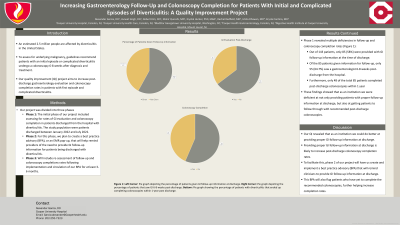Sunday Poster Session
Category: Colon
P0235 - Increasing Gastroenterology Follow-Up and Colonoscopy Completion for Patients With Initial and Complicated Episodes of Diverticulitis: A Quality Improvement Project
Sunday, October 27, 2024
3:30 PM - 7:00 PM ET
Location: Exhibit Hall E

Has Audio

Alexander Garcia, DO
Cooper University Hospital
Camden, NJ
Presenting Author(s)
Alexander Garcia, DO1, Avneet Singh, DO1, Robert Kim, DO1, Mahir Qureshi, MD1, Krystal Hunter, PhD, MBA2, Rachel Redfield, MD3, Ishita Dhawan, MD4, Krysta Contino, MD5
1Cooper University Hospital, Camden, NJ; 2Cooper University Health Care, Camden, NJ; 3MedStar Georgetown University Hospital, Washington, DC; 4Cooper Health Gastroenterology, Camden, NJ; 5Digestive Health Institute at Cooper University Hospital, Mount Laurel, NJ
Introduction: An estimated 2.5 million people are affected by diverticulitis in the United States. To assess for underlying malignancy, guidelines recommend patients with an initial episode or complicated diverticulitis undergo a colonoscopy 6-8 weeks after diagnosis and treatment. Our quality improvement (QI) project aims to increase post-discharge gastroenterology evaluation and colonoscopy completion rates in patients with first episode and complicated diverticulitis.
Methods: Our project was divided into three phases. In phase 1, we assessed for post-discharge GI evaluation and colonoscopy completion rates in patients discharged from the hospital with a diagnosis of diverticulitis between January 2022 and July 2022. A cohort of 143 patients were selected for analysis. Phase 2, our intervention phase, will include physician education and implementation of a best practice advisory (BPA). Finally, in phase 3 we will reassess rates of GI follow-up and colonoscopy completion to determine if our interventions were successful.
Results: A total of 143 patient charts were reviewed. Females exceeded male patients in number and the mean ages were 63.61 (±) 14.72 and 56.47 (±) 11.64, respectively. In this cohort, 54.8 % presented with their first diverticulitis flare, while 22.2 % and 23 % had one and two or more previous flares, respectively. Hispanic patients (52.2 %) had the highest percentage of complications, compared to Blacks (30.4 %) and Whites (35.6 %). Upon discharge, 85/143 (58 %) of the patients were provided follow-up information. For the patients provided with follow-up information, 55/85 (64.7 %) were evaluated by a gastroenterologist 6-8 weeks post-discharge, and 48/85 (56.47 %) completed colonoscopies within one year.
Discussion: Our project revealed multiple deficiencies in both GI evaluation and follow-up colonoscopy in post-diverticulitis patients. In the second phase of our project, we will implement BPA alerts and provide education to help facilitate the completion of screening colonoscopies.
Disclosures:
Alexander Garcia, DO1, Avneet Singh, DO1, Robert Kim, DO1, Mahir Qureshi, MD1, Krystal Hunter, PhD, MBA2, Rachel Redfield, MD3, Ishita Dhawan, MD4, Krysta Contino, MD5. P0235 - Increasing Gastroenterology Follow-Up and Colonoscopy Completion for Patients With Initial and Complicated Episodes of Diverticulitis: A Quality Improvement Project, ACG 2024 Annual Scientific Meeting Abstracts. Philadelphia, PA: American College of Gastroenterology.
1Cooper University Hospital, Camden, NJ; 2Cooper University Health Care, Camden, NJ; 3MedStar Georgetown University Hospital, Washington, DC; 4Cooper Health Gastroenterology, Camden, NJ; 5Digestive Health Institute at Cooper University Hospital, Mount Laurel, NJ
Introduction: An estimated 2.5 million people are affected by diverticulitis in the United States. To assess for underlying malignancy, guidelines recommend patients with an initial episode or complicated diverticulitis undergo a colonoscopy 6-8 weeks after diagnosis and treatment. Our quality improvement (QI) project aims to increase post-discharge gastroenterology evaluation and colonoscopy completion rates in patients with first episode and complicated diverticulitis.
Methods: Our project was divided into three phases. In phase 1, we assessed for post-discharge GI evaluation and colonoscopy completion rates in patients discharged from the hospital with a diagnosis of diverticulitis between January 2022 and July 2022. A cohort of 143 patients were selected for analysis. Phase 2, our intervention phase, will include physician education and implementation of a best practice advisory (BPA). Finally, in phase 3 we will reassess rates of GI follow-up and colonoscopy completion to determine if our interventions were successful.
Results: A total of 143 patient charts were reviewed. Females exceeded male patients in number and the mean ages were 63.61 (±) 14.72 and 56.47 (±) 11.64, respectively. In this cohort, 54.8 % presented with their first diverticulitis flare, while 22.2 % and 23 % had one and two or more previous flares, respectively. Hispanic patients (52.2 %) had the highest percentage of complications, compared to Blacks (30.4 %) and Whites (35.6 %). Upon discharge, 85/143 (58 %) of the patients were provided follow-up information. For the patients provided with follow-up information, 55/85 (64.7 %) were evaluated by a gastroenterologist 6-8 weeks post-discharge, and 48/85 (56.47 %) completed colonoscopies within one year.
Discussion: Our project revealed multiple deficiencies in both GI evaluation and follow-up colonoscopy in post-diverticulitis patients. In the second phase of our project, we will implement BPA alerts and provide education to help facilitate the completion of screening colonoscopies.
Disclosures:
Alexander Garcia indicated no relevant financial relationships.
Avneet Singh indicated no relevant financial relationships.
Robert Kim indicated no relevant financial relationships.
Mahir Qureshi indicated no relevant financial relationships.
Krystal Hunter indicated no relevant financial relationships.
Rachel Redfield indicated no relevant financial relationships.
Ishita Dhawan indicated no relevant financial relationships.
Krysta Contino indicated no relevant financial relationships.
Alexander Garcia, DO1, Avneet Singh, DO1, Robert Kim, DO1, Mahir Qureshi, MD1, Krystal Hunter, PhD, MBA2, Rachel Redfield, MD3, Ishita Dhawan, MD4, Krysta Contino, MD5. P0235 - Increasing Gastroenterology Follow-Up and Colonoscopy Completion for Patients With Initial and Complicated Episodes of Diverticulitis: A Quality Improvement Project, ACG 2024 Annual Scientific Meeting Abstracts. Philadelphia, PA: American College of Gastroenterology.
